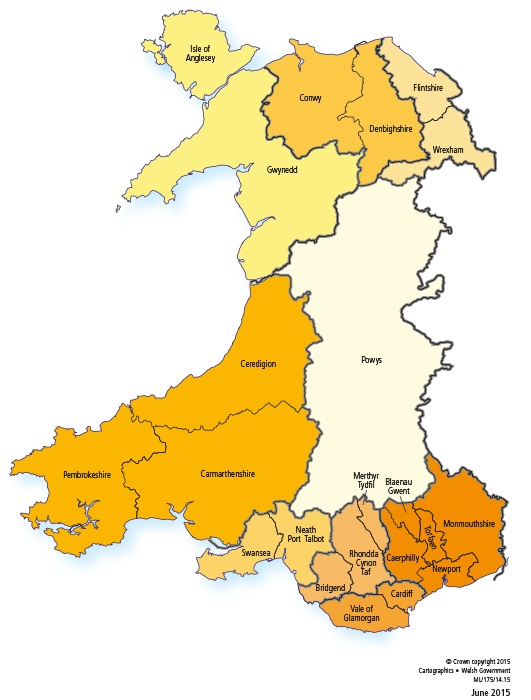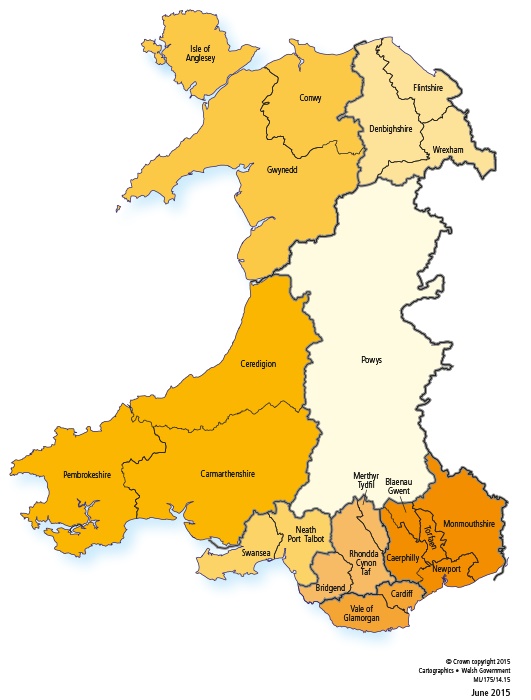17.06.15
Welsh government proposes massive reduction in number of councils
The Welsh government has published plans to reduce the number of local authorities in Wales from 22 to eight or nine.
The minister for public services, Leighton Andrews AM, has set out his vision for how local government should look, with two different proposals. One includes nine authorities with the other reducing the number to eight, but both are drawn broadly along the lines of the pre-1996 county council borders.
The historical county of Dyfed would be brought back by re-merging Carmarthenshire, Pembrokeshire and Ceredigion. West Glamorgan would also return by joining Swansea once more with Neath Port Talbot.
No names for the proposed new authorities have yet been suggested.
Andrews said: “The case for fewer local authorities in Wales is compelling and widely accepted. We cannot afford to miss this opportunity to reform and reshape our councils to drive funding into improving frontline services. We will drive down the cost of politics and administration in local government.
“This announcement provides further clarity on the future configuration of local authorities in Wales. It sets out our preference for the future structure in South, Mid and West Wales while facilitating further discussion around North Wales. The case in North Wales is finely balanced between two or three local authorities. We therefore feel that there is a case for a further debate and would welcome views.”
He stressed that this plan did not represent a final decision – the government will publish and consult on a draft Mergers and Reform Bill in the autumn.
The proposed combinations are:
Nine local authorities

- Isle of Anglesey and Gwynedd
- Conwy and Denbighshire
- Flintshire and Wrexham
- Ceredigion, Pembrokeshire and Carmarthenshire
- Swansea and Neath Port Talbot
- Bridgend, Rhondda Cynon Taf and Merthyr Tydfil
- Cardiff and the Vale of Glamorgan
- Blaenau Gwent, Caerphilly, Torfaen, Monmouthshire and Newport
- Powys
Eight local authorities

- Isle of Anglesey, Gwynedd and Conwy
- Denbighshire, Flintshire and Wrexham
- Ceredigion, Pembrokeshire and Carmarthenshire
- Swansea and Neath Port Talbot
- Bridgend, Rhondda Cynon Taf and Merthyr Tydfil
- Cardiff and the Vale of Glamorgan
- Blaenau Gwent, Caerphilly, Torfaen, Monmouthshire and Newport
- Powys
The Welsh Local Government Authority (WLGA) has released a statement on the new proposals that agrees there is widespread acceptance that the Welsh public sector needs to be radically transformed, however it believes there is no “political consensus” in either the Assembly or between the government and councils on how it should be done.
Cllr Bob Wellington, WLGA Leader and leader of Torfaen council, said: “We call on the Welsh Government today to work closely with the WLGA and hold an urgent summit of the 22 council leaders and senior ministers, to discuss the future of local government in Wales.
"This summit could debate the way forward in terms of structures, but more importantly set in place a new vision for local government which is currently at the epi entre of public sector funding cuts and is having to carry a disproportionate share of the huge austerity burden.
“The sustainability of authorities in Wales is in question over the next three years and it is time to examine all options for reforming public services across the board. This means looking at greater integration of health and social care, freeing up authorities from government bureaucracy and regulation and also empowering local communities through their councils.”
As part of the reforms Leighton Andrews has also announced that he will not proceed with some of the proposals in the Reforming Local Government - Power to Local People White Paper.
The previously proposed term limits for councillors; the phasing of local government elections; the removal of prohibition on officers standing for election in their own authorities; and the competency test that community councils should have a turnover of at least £200,000 have all been scrapped.
In addition, the current cap of 75 elected members per authority will be removed due to the move towards fewer, larger councils.
Tell us what you think – have your say below or email [email protected]